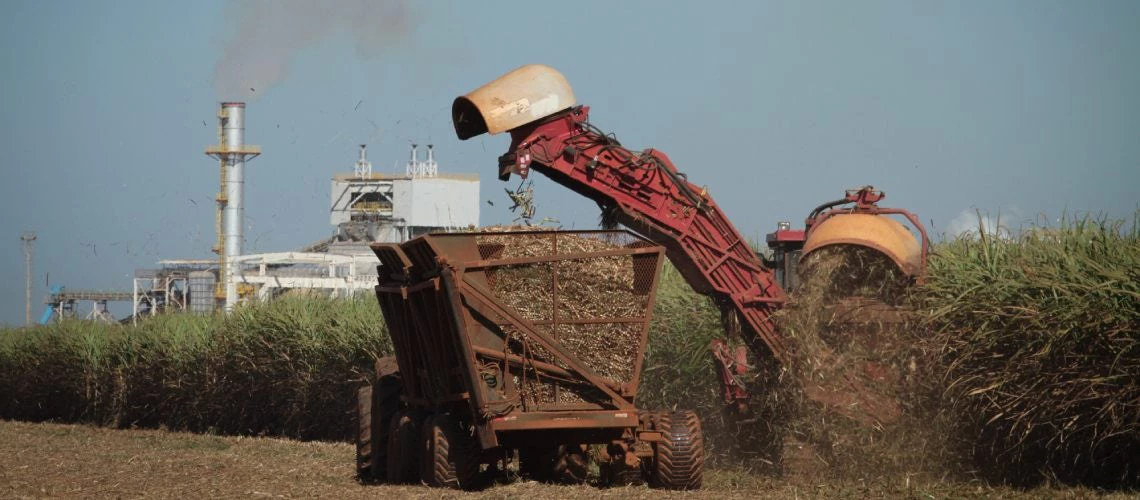 Sugarcane harvesting
Sugarcane harvesting
The Brazilian sugarcane industry is an enormous global producer of two equally important commodities, sugar and bioethanol. According to the 2023 Brazilian Energy Balance Report, the production of cane sugar (which one might mix in their morning coffee to make café doce) increased from 35.1 million tons in the 2021 harvest to 36.3 million tons in 2022, an increase of 3.4%.
Bioethanol has become increasingly relevant in the discussions around moving away from fossil fuels, as its combustion results in lower CO2 emissions. Between the 2021 and 2022 harvests, Brazil’s production of ethanol fell from 29.9 million m3 to 28.1 million m3, a decrease of 6.1%.
Furthermore, domestic renewable energy supplied from sugarcane fell from 16% in 2021 to 15% in 2022, the lowest Brazil has seen since 2012. These recent trends suggest that the Brazilian sugarcane balance may further tip towards sugar production in place of bioethanol, due to the higher international price of sugar compared to fuel ethanol.
Agriculture and the Economy
Brazil is the largest producer of sugar, and the second-largest producer of ethanol. During the 2022 crop cycle, Brazil made up 21% of global sugar production and 26% of global ethanol production. Brazil is expected to maintain its global status, with forecasts suggesting it will maintain 37% of the world’s sugarcane production in 2031. It dominates the sugar export market, with about 28 million metric tons of sugar exported in the 2022 harvest. This is 17 million metric tons more than the next largest exporter, Thailand. As the sugarcane industry continues to play a vital role in the Brazilian economy and global food trade, it presents an opportunity for Brazil to lead a global transition of the sector towards better environmental and human health outcomes. Sugar and ethanol are the seventh largest source of export earnings in Brazil’s overall trade balance, and are fourth within the agribusiness sector, at USD 11 billion. And the sugar, ethanol, and bioenergy industry employs 8% of the total registered agribusiness labor force in Brazil.
Plano Safra: opportunities
Enter Plano Safra, Brazil’s government program that aims to address the challenges faced by farmers in the country via subsidized credit lines and insurance for on-farm investments.
Agriculture public policies can support a more sustainable sugarcane industry in Brazil by incentivizing a shift from sugar to ethanol. Focusing on producing bioethanol may slow the growth in sugar production while maintaining sugar-adjacent labor. RenovAgro (Plano Safra’s program dedicated to climate smart agriculture) could finance producers that are currently producing or intending to shift to bioethanol, thereby promoting the creation of alternative jobs and livelihoods. Policies that mandate quotas in fuel and chemical fertilizers may also be beneficial to increasing demand for bioethanol in domestic markets. An increase in the mix of anhydrous ethanol with gasoline to 30-70% is being studied by the current government, which would incentivize higher consumption of the biofuel.
Sugar mills in Brazil use sugarcane bagasse for 100% of their energy production, with excess energy sold back to the grid. However, only 15% of potential electricity production from sugarcane (bioelectricity) is being utilized. Bioelectricity has the potential to power up to 30% of the country, and new capacity auctions could provide the industry with additional opportunities. In addition, more incentives for the industry to produce second generation ethanol from the cane bagasse and other sugar cane solid waste could further increase production of ethanol from sustainable sources. Public policies could lower market barriers for mills that are supplying green energy domestically and internationally. Producing more bioethanol and bioelectricity from the same quantity of sugar cane could be a lever to decarbonize other industries in the country and galvanize development in rural areas, through credit markets and other tools.
Greater intake of free sugars, or sugars that are added during the preparation and manufacturing of foods and beverages, are associated with higher rates of non-communicable diseases, such as obesity, heart disease, and dental issues. Brazil, a top 10 consumer of sugar, consumes, per capita, nearly 15 grams more than the recommended daily value.
By investing in the production of organic agriculture and decreasing the supply of cane for sugar production through shifting to bioethanol, Plano Safra may encourage consumers to intake less sugar while simultaneously creating markets for healthier products. Additional measures may be needed to address poor diet quality, such as implementing sugar taxes.
The Government of Brazil is making strides in expanding incentives for producers who are implementing low-carbon agriculture practices. However, these incentives are not making it to the sugarcane industry yet. In fact, there are some regulatory restrictions and “uneven” incentives for renewable energy that are not supporting the growth of bioelectricity and bioethanol. Therefore, Brazil, as a leader in sugarcane production, has a significant opportunity in helping the sector shift from sugar production to clean energy production, supporting the environment and a healthier world, contributing to curbing free sugar intake.
Brazil could be a leader in increasing demand and supply of bioethanol and bioelectricity, expanding the renewable energy market, and helping shift consumer behavior towards healthier food alternatives. These policies may come at a cost to free sugar consumers, but paying a bit extra for that café doce would be securing a better future for Brazil and for the planet.




Join the Conversation